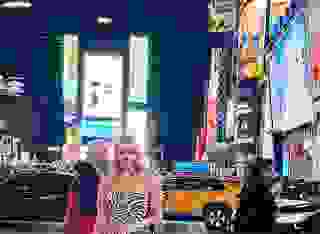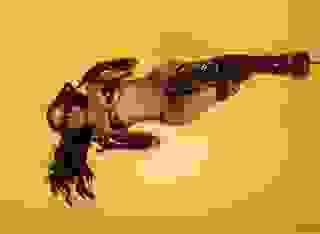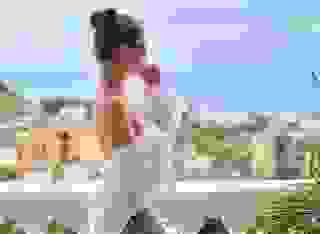- Novels and Novellas
- Havana Club Ch. 02
Note: You can change font size, font face, and turn on dark mode by clicking the "A" icon tab in the Story Info Box.
You can temporarily switch back to a Classic Literotica® experience during our ongoing public Beta testing. Please consider leaving feedback on issues you experience or suggest improvements.
Click hereChapter 2 – The Back of a T-Shirt
I checked in at the airport and waited for my flight. I tried reading a book I had brought along, but I was too nervous to concentrate on the story. I had to relax. The flight into Mexico was uneventful. When the plane was taxiing to the Cancun terminal, I saw a Soviet-built Cubana Air jet parked nearby. At a different time, I might have been fascinated by seeing one. Today, I knew that was probably what would be taking me away from the free world.
Mexican customs was very slow. The airport was packed with arriving vacationers. I stood in the "line" – really just a mass of people – for about half an hour without moving much. I noticed a glassed in office to the right, with a large portrait of Presidente Fox hanging on the back wall. I finally got through Immigration without a problem. I told the agent I was there for a week's vacation and he believed me. At Customs, I pressed the button on the traffic light and it lit up red. I had won the lottery and had to get my bags inspected. A nice lady politely went through all my bags, then helped me close them. I was in Mexico.
I found the shuttle bus going to the Hertz office and rented a car. It was a small car that blended in with all the other cars on the road. Perfect. With few hassles, I was on my way to my hotel out on the strip of sand. I checked into the hotel and put down my bags. Up to now, I was just another tourist. Now it was time for me to take the next step. I went back down to the parking lot and got in my car. I worked my way back through traffic to the coastal highway and headed south. I had noticed in the hotel lobby that the travel agent offered "Excursions to Cuba", but I had been told to use a certain travel agent in a little village south of here. He was well known to a friend of Ross and trustworthy. He was also very discrete. I drove south away from Cancun. The highway was incongruous. It was a modern 4-lane divided concrete road. The speed limit was about 80 MPH, but dropped to as low as 25 MPH in front of each of the numerous resorts along the coast. I found the traffic light and turned left. Now I was on a two lane road passing through what looked like marsh. I wondered if I had taken the wrong road. Finally, I arrived in the tiny village. As described, I found the main square, and its Catholic Church. On the other side of the church was the travel agent I was seeking. I parked and went inside the air-conditioned office. It was also a little out of place. On one side of the tiny room were computers connected to the Internet that could be used for a fee. The other side was the travel agency. I asked the receptionist for the name I had been given. She picked up a telephone and spoke to someone, then told me in Spanish that he would be there in a few minutes. I had a seat and leafed through the brochures on the table. One was about Cuba – big surprise.
A short, dark man walked into the back of the office and looked at me with a smile. I introduced myself and his grin widened. He had been expecting me. Unlike his secretary, he spoke English, though heavily accented.
"You want to go to Cuba, sí?" he asked.
"Yes, uh, I want to see Havana."
"Don't worry. I will take care of everything. You have your passport?"
I pulled it out and he handed it to his secretary.
"We must fax the first page to the Cuban embassy to get your visa. You can leave on Monday. When do you want to return?"
"Friday," I answered, hoping this would hold true.
"Very good. I will book you in an excellent hotel." He opened a large book on the secretary's desk and flipped to a dog-eared page. He reached over her and picked up her telephone. Dialing a number, he spoke in rapid Spanish to someone, then someone else. I marveled at how easily he had called Cuba, as he made my reservation. When he hung up, he continued with, "You have a room at the Hotel Nacional, an excellent choice." He opened a desk drawer and withdrew some forms. You will fly Cubana Air, OK?" I nodded. "The cost will be $250, US. You should pay in cash to avoid questions."
I nodded and took out my wallet. I counted out $250 and dropped it on the desk. He handed it to the secretary who tucked it away in a drawer. He started filling out forms.
"You can come back tomorrow afternoon to pick up your travel documents."
I asked, "What can you tell me about Cuba? Is there any chance my passport will get stamped?"
"No," he reassured me, "they will not stamp your passport. They know not to stamp U.S. passports. Don't worry about that."
"Can I bring my camera?"
"Sure. You can take pictures and they won't bother you. Just don't take any pictures of military installations, soldiers or policemen." He thought for a moment, then continued with, "You are a tourist. Ask no political questions. Be careful of what you talk about. You don't want to get into trouble, and you don't want to get anyone else into trouble."
We talked awhile and he made me feel better. I drove back to my hotel. I had the weekend to hang out on the beach and relax. I tried not to think about what I was going to do on Monday. I got some sun and enjoyed the sights, especially the female tourists. Remembering that I didn't want anyone to notice I was suddenly missing next week, I avoided getting friendly with anyone. On Saturday afternoon, I returned to the village and picked up my travel documents. Back in my hotel room, I just stared at the visa with my name on it, issued by the Republic of Cuba. I had reservations for a flight to Havana and a hotel room there. I was going to do it.
Monday morning came. I was nervous as soon as I woke up. I locked everything I wasn't taking in the room safe. I called for a taxi to the airport. It would be less obvious to leave the car in the hotel parking lot rather than the airport. Before I left, I called the Ontario office and left the rehearsed message that, when relayed to Ross, would tell him I was leaving for Havana.
The taxi dropped me off at the Cancun airport about midmorning. My flight was for high noon – a nice bit of drama. I walked into the airport and looked for the Cubana Air desk. I found the Cubana sign and walked up to the person behind the desk. First looking to my right and my left, I told the person I was there to check in for the flight to Havana. I spoke so quietly that she couldn't hear me over the din in the terminal. Gathering my courage, I repeated myself a little louder. She politely told me I was at the ticket office. The check-in desk was at the other end of the terminal. Embarrassed, I sought out the check-in desk.
There was a line at the desk. I waited my turn, feeling very conspicuous. When I got to the red Formica counter, I handed over my ticket. My one bag was checked. I watched it being tagged for Havana. I was given a boarding pass that was in Spanish and English. Some of the English words were misspelled.
I went through security and walked down to my gate. I felt even more conspicuous waiting at the gate. I stared at the overhead monitor. Listed along with more "conventional" destinations of Chicago, Houston and Miami was my flight going to Havana. My stomach was tied in knots. I was really going to do this. A lady came around and asked me to take a survey. I started to fill it out, then left blank anything that identified me. I rememberedNo Paper Trails. As the time to board neared, more people filled the waiting area. Adults, children, young couples all going to Cuba today; it was surreal. A large Marlboro sign in Spanish was on the wall above the waiting area. A trio of Mexican immigration officials moved in behind the desk and the passengers formed a line. I took my place in line, feeling as if I was shuffling toward my execution. As I had been briefed, I slipped a twenty dollar bill in my passport along with the Mexican tourist visa before I handed it to the agent. I smiled and said, "No stamp, please." He grunted, removed the twenty, pointed toward the door and handed my passport back. Good. There was no proof I had left Mexico. I had also just committed bribery. My first of several crimes today. I walked through the glass door. There was a brown bus waiting to take us to the plane. I was sitting on the bus facing the door to the terminal, and I noticed there was no handle on the outside of the door. It was clearly exit only. There was no returning to Mexico. No turning back. I was going to Cuba.
The wait on the bus seemed like hours. Finally, all the passengers were processed and aboard. We took a short ride to the waiting Yak-42, which looked strangely like a 727. The two big differences were the wheels and the Cuban flag painted next to the door. As I was getting off the bus, I noticed the word ESCAPE painted over the door. That is just what a part of me wanted to do. I forced my legs to carry me to the base of the stairs.
We had to wait to board the plane. As I stood there, I kept looking at the Cuban flag painted on the side of the plane. Once I boarded, I was going to Cuba. The smell of jet fuel was thick in the air. The aluminum handrail of the stairs felt strangely cold in the tropical sun. The whine of jet engines blocked all other sound. Finally, an arm clad in a white shirt stuck out the door and waved us aboard. My feet left Mexican soil and climbed the stairs. When I got to the top, I saw how short the door was. I had to stoop over to climb through.
Immediately, it was apparent I was the guy from out of town. Everything on the plane was labeled in Russian. Most things were also labeled in Spanish. Some things, as an afterthought, were labeled in English. The seats were three across on each side, labeled according to the Cyrillic alphabet ABVGDE. I peaked into the cockpit as I passed. It looked fairly modern. The electronics were dated, but appeared to be functioning. I sat down and buckled up. Looking forward, I noticed that the cockpit door had been reinforced with metal. I found this strange. I thought the changes were mandated by the FAA after September 11. This was one plane that was never landing in the United States.
I paid special attention to the safety briefing. I had never flown on a plane like this. First, the briefing was in Spanish. I was glad I spoke Spanish because the English version was not nearly as detailed or understandable. Another difference was the lack of a ban on smoking. Cigarette smoke quickly filled the cabin as passengers and crew lit up.
We were soon in the air. As the wheels lifted off, I felt my last contact with the free world lost. When we touched down, it would be on Cuban soil. I watched the coastline of Mexico pass below. Ahead was water, and Communism. On the plane, I drank a Cuban Tucola, realizing I would not see a Coca-Cola until I returned to Mexico.If I returned to Mexico, I reminded myself.
The coast of Cuba appeared, looking beautiful. I was glued to the window, getting my first glimpses of the forbidden land. I was fascinated by the lush greenery of the crops and the red soil. Everything looked so fertile.
We flew over what looked like an abandoned airport, then a few minutes later descended towards a modern airport. There were a few sparse palm trees growing along the runway. There were planes on the ground. Many of them belonged to Cubana Air. The name on the building was Jose Marti International Airport. From the outside, everything looked just like any other airport. Our plane taxied to a building set apart from the others. As the plane turned into position to meet the portable stairs, I saw the first sign that the "embargo" was a farce. This was one of many signs I would be seeing. There were two jets parked on either side of our plane. One was American Eagle, the other Continental. After all I just went through to get to where a flight going to Havana would leave from, I saw two U.S. planes on the ground. Then I noticed something that made this airport look different from any other I had ever seen. A soldier with an automatic rifle was guarding each plane, probably to prevent anyone from stowing away in the wheel wells or sneaking aboard. The underside of each plane was patrolled, and an armed soldier also stood at the base of the stairs leading up to the plane. The soldiers wore mint green fatigues, lighter colored than I have seen soldiers wearing in other countries.
As soon as the plane stopped, the passengers crowded the aisle—just like everywhere else. The door of the plane opened and the passengers exited. I bent over and moved through the hatch, stepping onto the portable stairs. I looked around. Except for the soldiers, nothing else seemed different. My stomach told me differently. There was a knot in the bottom, a reminder that I still had to pass through Cuban customs. If my passport got stamped, I was doomed. I tried to push that fear to the back of my mind but it wouldn't budge. It was time to fish or cut bait and I hadn't brought my knife. I was going fishing. We were herded into the building and into lines. There were booths at one end. A door unlocked and it was my turn to enter. I entered and the door closed behind me. The door locked on its own. The other end of the booth was also a locked door. A glassed-in office was to my side. Behind the glass sat a woman with curly black hair. She was dressed in mint green fatigues. I passed my visa, landing card and passport through the slot at the bottom of the window. She took it and smiled. I did my best to smile back though I was so nervous that I wanted to vomit. She put my paperwork on the desk that was below the window and out of my sight. She asked if this was my first visit to Cuba. Her English was excellent. I croaked out that it was. She asked me the purpose of my visit and I lied, "Vacation."
"Who are you traveling with?"
I answered, "No one. I'm alone." I felt very alone at that moment.
She picked up a rubber stamp. I heard her stamp something on the desk but I couldn't see what she was stamping. Stamp. Stamp. Stamp. Shit! Three stamps! I had handed her three pieces of paper – my landing card, my visa and mypassport. It was too late to do anything about it. I felt weak. She, however, smiled and told me to enjoy my visit to Cuba. There was a buzz to my left. The door had unlocked. I gathered my passport and visa, then exited through the door.
As soon as the door closed behind me, I nervously leafed through my passport, my hands shaking. I didn't see any new stamps. I went through it a second time, page by page, front and back. There was no new stamp on my passport. She hadn't stamped it. She must have stamped something else. There was sweat on my forehead, but I felt the relief washing through me. I was still alright. I had made it through immigration. I took a deep breath, then a few steps towards baggage claim. I heard a buzz behind me to one side. I looked back and saw another of the passengers exiting a booth. He was also nervously looking through his passport, a U.S. passport. He broke into a smile as he realized there was no stamp in it. I understood his relief. He looked up and our eyes met. We both smiled.
In baggage claim, I saw the second sign of the farce. Over the belt was a lit sign that said, "Need money in a hurry? Call Western Union." The familiar black and yellow sign was very out of place in a country that wasn't supposed to be able to do business with American companies. I was still pondering this as the belt rumbled to life. I collected my bag and moved towards the inspection queue. That was when I noticed the dogs. Blond haired cocker spaniels were weaving through people's legs, moving through the crowd. I followed one for a minute or two with my eyes and noticed that they all were returning to a dark-haired man in a uniform who was crouched down. As a dog returned, he petted it, then pointed to someone in the crowd. The dog obediently bounded off to "inspect" that person's baggage, returning when nothing unusual was found.
The line moved a little slowly. As I got to the head, a woman in fatigues bent down to my bag. I waited for her to inspect it, maybe even disassemble it. She was merely removing the airline tag. Then she stood and waved me on to the street. That was so easy!
I now found myself on the street. I looked for someone holding a Havanatur sign. I wandered through the crowd for only about two minutes before I found him. I showed him my paperwork and he escorted me to a van. A new Ford van. He ushered me inside. There were other passengers already in there. He left to find a few more passengers. I looked around and recognized all of them as Americans from my flight. We chatted about our trips. One family was from California, another was a group of young college students on an adventure. I peered around the driver's seat to be sure I wasn't imagining the Ford name on the back of the van. The Ford logo on the steering wheel confirmed it. Even the layout of the dashboard was familiar. I looked out the window and immediately discovered another icon of Cuba, American automobiles from the 1950's. There were many of them, painted bright tropical hues of turquoise, red, and yellow. All appeared to be in excellent condition, restored to showroom perfection. It would have been like the set of a movie about the 1950's, except for the Russian Ladas and Japanese Mitsubishis, along with a scattered Mercedes or two.
The driver returned with two more passengers. After they were onboard, he got in the driver's seat and we drove off. I started questioning him. He spoke no English.
"This is a Ford van?" I asked in Spanish.
"Sí."
"Anew Ford van?"
"Sí," he answered, now with a big toothy grin.
"How is this possible?"
His answer was obvious once he said it. "From Canada."
Sothat was how the Cubans were getting new American goods. Over the next few days, I would learn just how extensive this practice was. We drove out of the parking lot onto the road to Havana. Immediately I saw that none of the billboards advertised goods or services, except for one about a place where you could swim with dolphins. Every other one extolled the virtues of Cuba and the revolution, praised Castro, or reminded that the Committee for the Defense of the Revolution (CDR) was watching. One caught my eye and filled my heart with unease. It was a sketch of Jose Marti and Che Guerva flanking Osama bin Laden. The caption was "Anti-Imperialists". I tried to shrink further into my seat and look less conspicuous.
I was trying to look everywhere at once. I wished I had more eyes to take it all in. I was absorbing the conditions of the housing and social services. I saw the construction equipment rusting away, decaying buildings, ancient cars sharing the road with horse-drawn wagons, bicycles and motorcycles with sidecars. Anything that moved was utilized and the smaller the better. I saw these yellow scooters that looked like football helmets built onto three-wheeled motorcycles. I noticed a trailer that looked like a bus, pulled by a tractor trailer. It was packed with people until not another could be squeezed in. The driver told me it was a camel – their version of city bus. We drove down a narrow street. In the distance was a grand hotel. As we got nearer, I saw it had a palm-tree lined driveway, immaculately maintained. The vision was incongruous alongside the decaying buildings. There was a statue of a woman field worker in front. The marble façade was engraved withHotel Nacional de Cuba. So this was my hotel. Wow!
The van pulled under the covered entrance and a uniformed doorman helped me out. I got my bag from the driver and walked inside. The stairs and the handrail were carved from blocks of marble. The lobby was grand. The ceiling was carved wood, the floor inlaid tile. The travel agent was right. This must be the grandest hotel in Havana. After what I had seen driving here, I never expected there was such a building as nice or as clean as this in the entire city. I checked in (in Spanish), signing the register and nervously scrawling my home address. Now there was a record, in my own handwriting, that I had been to Cuba. A bellman arrived and took my bag, leading the way up to my room.








